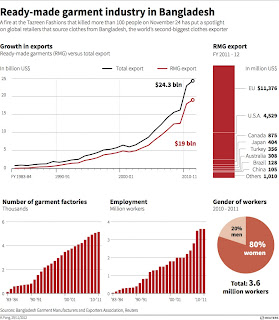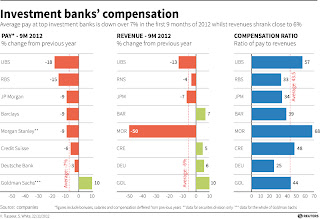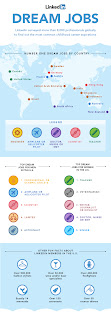Via: NYT
Friday, November 30, 2012
Friday Links
- Kinkiness Index ? Fifty shades of data-visualisations: On sex and text | The Economist http://bit.ly/Yu6o3l
- Twitter and libel law: A little bird told me | The Economist http://bit.ly/Y7vCV7
- "Why you get sick when flying" http://bit.ly/V1rgZq
- Why I stopped blogging and hopefully won’t ever again http://bit.ly/WSYq3d
- Holiday Shopping Tips From Behavioral Economists - Bloomberg http://bit.ly/X1CF1g
- Give And Take: How The Rule Of Reciprocation Binds Us : Shots - Health News : NPR http://bit.ly/WSmt2m
- The rise in the use of C-sections in recent decades | Harvard Magazine Nov-Dec 2012 http://bit.ly/VayA52
- Don’t look to Black Friday for clues to the market - The Globe and Mail http://bit.ly/VayABX
- Girls, guns and yoga: Anti-virus software guru John McAfee's odd life in 'pirate haven' - Times Of India http://bit.ly/YxNYi8
- New York's Mayor on Everything From Campaign Money to Circumcision - James Bennet - The Atlantic http://bit.ly/VayGJS
Thursday, November 29, 2012
Quick note on the US debt ceiling
“Currently the Treasury is just $81 billion from the $16.394 trillion debt ceiling limit. This limit is expected to be reached in the next two weeks. After that the Treasury will run down its cash balances and ‘borrow’ from government trust funds and pension funds. This should allow the government to fund itself through February. As a side note, if a private sector company funds itself by running down cash balances and raiding trust and pension funds, everyone goes to jail. When the government does it, it is considered sophisticated asset/liability public sector management.” Jim Bianco, November 28, 2012
Via: BR
Thursday Links
- Big Picture Holiday Shopping Ideas! http://flpbd.it/XUjHQ $$
#wacky - Video from Nate (
@fivethirtyeight) Silver speaking at Google this week - http://bit.ly/X2yt1e - Cesareans, “cascading interventions,” and finding a sense of balance http://flpbd.it/KmYJh
- "Something is wrong with my iPad: I still hate my life." http://flpbd.it/9yiRT
- Emotionally intelligent signage: Coffee, poop, and vintage biker chicks http://flpbd.it/HTrYj (via the Pink Blog)
- xkcd: Calendar of meaningful dates . . .http://flpbd.it/dN3jI via
@flowingdata - Fifty shades of data-visualisations: On sex and text - http://flpbd.it/WUEnD
- Ernesto Sirolli: Want to help someone? Shut up and listen! -Ted talkshttp://www.ted.com/talks/ernesto_sirolli_want_to_help_someone_shut_up_and_listen.html?utm_source=twitter&source=twitter&utm_medium=social&utm_campaign=ios-share …
- Tthe half life of factshttp://flpbd.it/XunP9 - Economist
- Assholes: A Theory - Books - Macleans.ca http://bit.ly/V6OCwI
Wednesday, November 28, 2012
Wednesday Links
- Gold prices skyrocket this morning pic.twitter.com/X9wPHmwb
- New post on one of the funniest depositions ever -- of Bank of America CEO Brian "I don't recall" Moynihanhttp://flpbd.it/kYGeh
- Bits Blog: Apple Fires a Manager Over Its Misfire on Maps http://flpbd.it/xjZ4w
- Viacom promoted its M&A head to chief financial officer. Thank the Teenage Mutant Ninja Turtles. http://flpbd.it/jOUai
- Obama will meet with top CEOs to get
#FiscalCliffsupport http://flpbd.it/X7S4Z - .S. Treasury declines to name China currency manipulator | http://flpbd.it/zw4rM
- Interview with Persi Diaconis | CHANCE http://bit.ly/WWoPxa
@cmrn_dp - Dimon Best to Lead Treasury in Crisis, Buffett Says - Bloomberghttp://bit.ly/V4oEtz
- New Breed of SAC Capital Hire Is at Center of Insider Trading Case http://flpbd.it/pqPS7
- Dow Jones’s portfolio is as eclectic as a newspaper’s classifieds section http://flpbd.it/FFksP
- LOL Catch up: BBC appoints Tony Hall as new director generalhttp://gu.com/p/3c2jv/tw + ITV to pay £125,000 in damageshttp://gu.com/p/3c2yc/tw
- Missing: Little Strip of Paper With Phone Number On It http://flpbd.it/xZlxQ
A lesson from Roman History
Thought it would be interesting to share the history of the Roman empire and its currency. The following is an excerpt from a speech by Joseph R. Peden given in 2009.
“Portugal is not Greece” – The Economist, April 2010
“Greece is not Ireland” – George Papaconstantinou, Greek Finance Minister, November 2010
“Spain is neither Ireland nor Portugal” – Elena Salgado, Spanish Finance Minister, Nov. 2010
“Ireland is not in ‘Greek Territory’” – Irish Finance Minister Brian Lenihan, November 2010
“Neither Spain nor Portugal is Ireland” – Angel Gurria, Secretary-General OECD, Nov. 2010
“Italy is not Spain” – Ed Parker, Fitch MD, June 12, 2012
“Spain is not Uganda” – Spanish PM Mariano Rajoy, June 2012
“Uganda does not want to be Spain” – Ugandan foreign minister, June 13, 2012
Sources/further reading:
Ludwig von Mises
Counterargument to above
Cato
John Mauldin
Shale Gas: What the frack[video]
Tuesday, November 27, 2012
Tuesday Links
Food: Bone Marrow's Peculiar Appeal - Newsweek and The Daily Beast http://bit.ly/YnjIqh
The Patent Problem | Wired Opinion | Wired.com http://bit.ly/UDF3uu
An ancient civilization's wet ascent, dry demise | Humans | Science News http://bit.ly/VWpdXd
MO ALI and what we can learn about investing from his comeback TTMYGH
HP and Autonomy: Conflicting accounts | The Economist http://bit.ly/YnlCXJ
UBS’s rogue trader: Collective responsibility | The Economist http://bit.ly/YnlF5Y
Sunday, November 25, 2012
Socrates on Happiness[video]
Socrates was executed for his non-conformist views on life and his disbelief in the 'gods'. Perhaps there was method to this madness. Or as he said - 'An unexplained life isn't really worth living for'.
Friday, November 23, 2012
Friday Links
- America's Two Earliest Startups Gave True Meaning To 'Perseverance' - Business Insider http://bit.ly/Y7jNht
- When the U.S. Asked Europe for Its Money Back - Bloomberg http://bit.ly/WFUNNZ
- All Hail the Sweet Potato http://bit.ly/UwT1us
- 7 More Habits of Highly Successful Bloggers http://bit.ly/WBaiqx
- BBC News - Economist magazine bets professor over China's future http://bit.ly/W2ZhJH
- HP's Autonomess should devour Marc Andreessen, too | Columns | Breakingviews http://bit.ly/UwT6ye
- Five economic trends to be thankful for http://bit.ly/UTjkt2
- BBC News - How technology opens the door for personalised pricing http://bit.ly/Y1QNrs
- Bill McBride Of Calculated Risk - Business Insider http://bit.ly/Y8Uzzk
Thursday, November 22, 2012
Thursday Links
- What Killed Michael Porter's Monitor Group? The One Force That Really Matters - Forbes http://bit.ly/Ug8TkV
- A Brief History of Chocolate | Arts & Culture | Smithsonian Magazine http://bit.ly/UrdT6p
- What Was on the Menu at the First Thanksgiving? | History & Archaeology | Smithsonian Magazine http://bit.ly/ti8kos
- Jack Welch: An Oral History - Businessweek http://bit.ly/WBWxrD
- Hank Greenberg Will Not Be Getting His $25 Billion Back This Week « http://bit.ly/WBWzzH
- Norway: The Last Haven? | Institutional Investor http://bit.ly/Ure3KS
- RIM CEO Confident About BlackBerry 10 and RIM's Future in Mobile Computing | Gadget Lab | Wired.com http://bit.ly/UQR1LH
- Nancy Folbre: Of Parents, Puppies and Robots http://bit.ly/WBWH2i
- Have the Courage to Be Direct - Anthony Tjan - Harvard Business Review http://bit.ly/THbAvt
Tuesday, November 20, 2012
FW: Sex Sells JGBs
| This is one of those so bizarre you wonder if its real things: Apparently, according to this Bloomberg article – Women Prefer Men Holding State Bonds, Japan Ad Says — yes, it is:
"Men that own government bonds are popular with the ladies!" Yes, its a slow holiday week . . . |
A brief history of the Drachma
A national monetary system, based on silver, was established for the first time in 1828. This silver standard prevailed until 1832. In 1831, the currency’s convertibility into silver was suspended, and paper money was created to finance the budget deficits.
In May 1832, Otto’s monarchy succeeded democracy. Nine months later, in February 1833, bimetallism was introduced as the new monetary standard, and Otto’s Drachma was launched as the new legal tender. This was a silver currency. It weighed 4.029 grams of pure silver and was put into circulation in denominations of 0.5, 1 and 5 drachmas. In order to facilitate transactions, given the limited amount of drachmas in circulation,foreign currencies were allowed by law to circulate freely in the domestic money market.
However, the majority of these were tarnished, with a face value much higher than their
market value. As a result, Greek silver and gold coins quickly out-flowed since holders of foreign debased coins exchanged them for drachmas, which they then melted to obtain the precious metal. Thus, the drachma soon became an “ideal currency” that was used as “an accounting unit for foreign currencies and things of value”.
Growth in Greece was slow during those times due to lack of private investment capital. The first and second Independence loans contracted in Great Britain were greeted as a successful instigation of economic alliances with Western Europe, hence, an international recognition of the Struggle for Independence and of the fledgling Greek State.
However, these loans were not used for the purpose for which they had been intended, i.e. the furtherance and expansion of the Struggle for Independence. The first loan (472,000 pounds sterling) financed the civil wars of the years 1824-25, whereas the second loan (1.1 million pounds sterling) was squandered almost in its entirety abroad, either in England and America for the purchase of canons and the building of battleships – which never arrived in Greece.
Greece’s inability to repay the Independence loans destroyed the country’s reputation
as a borrower and deprived her of the European capital markets for a long period of time. The lack of money resources for the organization of the fledgling State’s domestic administration, the restoration of public safety, and the development of agriculture and commerce, created an urgent need for a new foreign loan.
However, this loan was also wasted in unproductive expenditures, such as the expenses of the Regency and the maintenance of a costly and unnecessary Bavarian army.
Bank of Greece
Bloomberg Echoes
Tuesday Links
- Who is McAfee? http://bit.ly/UOJYDp
- 'Bonkers' McAfee still on the run, with young woman | Herald Sun http://bit.ly/Wt62cy
- MarketPsych: Applying Behavior Finance: Traders Who Take Sex Hormones and the Impact of Investor Anger on Prices http://bit.ly/Ue7IST
- 1 | The 4 Secrets Behind Zynga’s Narcotically Addictive Games | Co.Design: business + innovation + design http://bit.ly/U8dwgX
- This is your brain on coupons http://bit.ly/WpLMsh
- McSweeney’s Internet Tendency: Welcome to Belinda’s Private Equity Immersion Daycare. http://bit.ly/Wt69F1
- How Music at the Office Affects Your Work Life - Businessweek http://bit.ly/Ue7POj
- Why We Like Crisp, New Dollar Bills - Businessweek http://bit.ly/Ue7QC0
- The Plot to Destroy America's Beer - Businessweek http://bit.ly/Sd5Sn0
Monday, November 19, 2012
Why I don't read fiction
I spend a lot of time on the subway, but actually kind of like it because it forces me to open and close my work hours with some reading. There’s lots of people who take transit actually. Usually in the mornings I see people talk to their friends, catch up on some shut eye, listen to music and of course I see women fixing their makeup(I’ll refrain from making judgments on whether this is appropriate or not). I’m usually one of the few who has a my tablet whipped out and as always, reading through my never ending stack of journalism and research on investing, business, economics, science, politics, profiles etc.
People often ask me why I don’t read fiction? Now that being said, I used to love fiction as a child, and my parents used to buy me lots of books and read to me as well; my favorite fiction book is still ’20,000 leagues under the sea’, but when people ask me that question, I usually flip the question back at them, and typically find the answer to be the same-‘to get away from reality and enter a world where anything could happen.’
I’ve always found it to be the case that fiction readers are the ones who tend to be disappointed with their lives and try to get away to a world they wish they could have been part of. I never read fiction because I always feel that I’m not learning anything, but perhaps that’s not my true motivation. Maybe I’ll never find out the true answer to that question, but it’s definitely something to think about.
Why are you reading fiction?
Monday Links
- Starbucks CEO: ‘We Will Do for Tea What We Did for Coffee’ - Deal Journal - WSJ http://bit.ly/XHPXjy
- Proof that austerity measures are making European economies worse, not better – Quartz http://bit.ly/U8wBPO
- Twitter's descent into the extractive by David of 37signals http://buff.ly/WiB3je
- 9 Rules for Life, Digital Media and Financial Publishing http://bit.ly/U4Xcxc
- Learning to Love Volatility: Nassim Nicholas Taleb on the Antifragile http://bit.ly/WiqNro
- ‘The Queen of Versailles’: the best film on the Great Recession http://bit.ly/U8wIeh
- The new boom: Shale gas fueling an American industrial revival - The Washington Post http://bit.ly/WpcIZb
- How a $20 tablet from India could blindside PC makers, educate billions and transform computing as we know it – Quartz http://bit.ly/XvX2U6
- Amazon's Jeff Bezos: The ultimate disrupter - Fortune Management http://bit.ly/WeE0By
- Steve Jobs vs. Sam Walton: The tale of the tape - Fortune Management http://bit.ly/XKlIsk
- Why Your Heartburn Drugs Don't Work http://bit.ly/WpcPUt
- As Craft Brew Sales Grow Frothy, Pourers With Pedigrees Bubble Up http://bit.ly/TGcN6n
Saturday, November 17, 2012
Saturday Links
- Learn to be Charismatic - Scott Edinger - Harvard Business Reviewhttp://bit.ly/TBCswZ
- Why Coke Cost A Nickel For 70 Years : Planet Money : NPRhttp://bit.ly/UIPrM6
- A Letter to My Ex-Wife : The New Yorker http://bit.ly/WfNah4
- 'Oddly Normal': John Schwartz Tells Poignant Tale Of What Happened When His Teen Son Came Out http://bit.ly/TViFZo
- Intermission: six-year-old piano prodigy is utterly ridiculoushttp://ow.ly/fm9jp
- RIP Hostess http://bit.ly/S35UM1 also Hostess Brands Says It Will Liquidate http://bit.ly/TSVC1k
- How I learned a language in 22 hours | Education | The Guardianhttp://bit.ly/TUXPtj
- Warren Buffet fiscal cliff: Why he’s not worried | Business Insider | Financial Post http://bit.ly/Wfvfal
- Business Insider Wonders: Are Women Too Lazy to Succeed at Goldman Sachs? http://bit.ly/TUvGCF
- Nature's Own Hedge Fund - Businessweek http://bit.ly/Wfh4Su
- Japan's Hottest Commodity: Water - Businessweek http://bit.ly/TUsoPM
- You Google Wrong - Technology - The Atlantic Wire http://bit.ly/XJ7kjR
- The Law and Order Database: All 20 Seasons | Overthinking Ithttp://bit.ly/XDIORa
- BBC News - BP gets record US criminal fine over Deepwater disaster http://bit.ly/UHZssO
- The Danish government has rescinded one of its most hated taxes: a tariff on saturated fats http://econ.st/ZSOntE
Friday, November 16, 2012
Friday Links
- The Danish government has rescinded one of its most hated taxes: a tariff on saturated fats http://econ.st/ZSOntE
- Brain Scans of Rappers Shed Light on Creativity http://bit.ly/ZDafKw
- LOL: John Travolta, Olivia Newton-John Christmas Album Plunges Nation Into Double-Dip Recession | http://bit.ly/UFIk70
- Mitt Romney losing likes on Facebook, in real-time http://bit.ly/WbvOSx
- HowStuffWorks "What did Abraham Lincoln invent?" http://bit.ly/WblF8v
- Google vs. Samsung | asymco http://bit.ly/TIbB2m
- How China Became Capitalist — The American Magazine http://bit.ly/W9I9qm
- Human intelligence 'peaked thousands of years ago and we've been on an intellectual and emotional decline ever since' - Science - News - The Independent http://bit.ly/TAKTIR
- Why Things Fail: From Tires to Helicopter Blades, Everything Breaks Eventually | Wired Design | Wired.com http://bit.ly/RgshwJ
- BofA Client-Meeting Quota Said to Vex Investment Bankers - Bloomberg http://bit.ly/UGDcj8
Thursday, November 15, 2012
Stunning interactive tour of the glalaxy
via: FD
Sort of reminds me of this amazing video from Hitchens voice explaining how science saved his soul:
Thursday Links
- Puppies: The new indicator of prosperity? http://bit.ly/TMuyRp
- UPDATE 2-U.S. regulators cut JPMorgan's ability to trade power | Reuters http://bit.ly/TOjx2a
- Record-High 50% of Americans Favor Legalizing Marijuana Usehttp://bit.ly/Rj5Rx8
- xkcd: Logic Boat http://bit.ly/TOiv6e
- The decline and fall of the text message - MarketWatchhttp://bit.ly/Wbbdh0
- Starbucks With Teavana Moves Schultz Beyond Coffee Roots - Bloomberg http://bit.ly/W7cxl1
- Kass: It's the Earnings, Stupid - TheStreet http://bit.ly/Wb9A37
- The 10 Most Under-Rated Reasons Why You Should Get An MBA - Forbes http://bit.ly/XCnoEf
- Venice Under Water - In Focus - The Atlantic http://bit.ly/Xy6tT1
And a quick picture of the day from National Geographic:
Wednesday, November 14, 2012
Wednesday Links
- Fight It Out to See Who's the Most Human | Wired Enterprise | http://Wired.com http://www.wired.com/wiredenterprise/2012/11/twitterbots/
- Letting Go of the Stress of Measuring :zenhabitshttp://bit.ly/RAFIIM
- The secret to making great coffee revealed. - Slate Magazinehttp://bit.ly/TB3F2K
- iFatigue - The endless cycle of Apple products that are released at the pace of a rampaging water buffalo an... - http://urbanup.com/6826869
- Craft Beers Arrive at Chipotle, Other 'Fast-Casual' Restaurants http://bit.ly/W5oFDg
- Women Make Better Traders http://bit.ly/TG8cB6
- False Posts on Facebook Undermine Its Credibility http://bit.ly/W5oJCT
- Innovation -- NOT Uncertainty -- Is America’s Key Problem http://bit.ly/Tu45YR
- Why Are So Many Single-Parent Families in Poverty? - Karen Kornbluh - The Atlantic http://bit.ly/TG98oW
- The Onion Book of Known Knowledge: True lies | The Economist http://bit.ly/TrG6JE
- Why “Multicultural Society” Is a Logical Impossibility
@SatoshiKanazawa http://flpbd.it/VY462 - James Bond 007: Movie Deathmatch - YouTube http://bit.ly/TgzWfu
- Working Mom BigLaw Departure Memo - Business Insider http://bit.ly/Tgf1ZL
Tuesday, November 13, 2012
US energy independence[chart]
It’s interesting to see how the shale gas boom is making the US energy independent again. Return of the US superpower perhaps?
Via: Economist
Diwali Links
- Gambler’s fallacy: The lesson I learnt last Diwali | Firstpost http://bit.ly/TAcLwL
- Economics Journal: The Economic Theory Behind Diwali Baksheesh - India Real Time - WSJ http://bit.ly/W18Pti
- How Coffee Revolutionized the World | The Big Picture http://bit.ly/TA8vgD
- 8 great scenes from war movies:http://flpbd.it/zJcBT [veterans day homage]
- S&P, Fitch face landmark trial over Italy downgrades http://flpbd.it/MyCvO
- Why there’s a boom in Chinese students attending US universitieshttp://flpbd.it/U7A4b
- New Study Finds More Young Swedish Men Becoming Prostitutes Than Women http://flpbd.it/NpUoy
- The 40-Year-Old Intern http://flpbd.it/628ax
- 50th anniversary of the Russian Revolution in colour, Moscow,…http://flpbd.it/PPnQh
- Jeffco merger deck [pdf] http://bit.ly/VY9HyU
- France's 'Nutella amendment' causes big fat international row | World news | The Guardian http://bit.ly/TvUXCM
- Auguste Rodin's 'The Thinker' gets a Google Doodle http://buff.ly/VY3UsZ
- Paul Rudnick: My Crush on Nate Silver : The New Yorkerhttp://bit.ly/XxRpVy
- Chart of the day: American's flying over Thanksgiving - The recession is over
@FactSet http://bit.ly/TuoWex - CEO and co-founder of
#Movember, proves that facial hair can be fun—and revolutionary:http://flpbd.it/Riral













